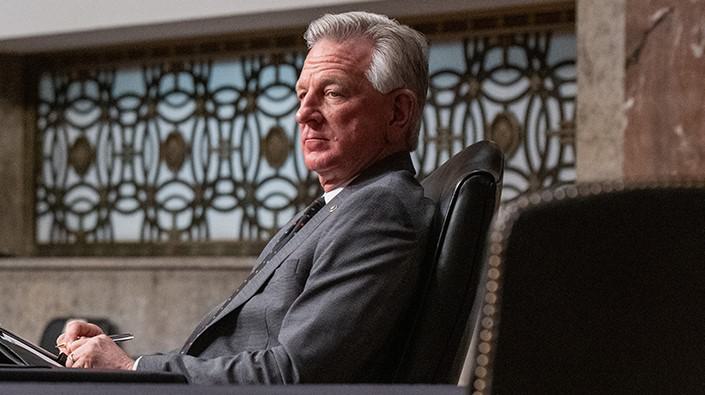By Brandon Moseley
U.S. Senator Tommy Tuberville (R-Alabama), joined U.S Sen. Richard Burr (R-North Carolina), the Ranking Member of the Senate Health, Education, Labor, and Pensions (HELP) committee, to send three separate letters to Gregory M. Kausner, U.S. Department of Defense (DoD) Acting Under Secretary of Defense for Acquisition and Sustainment; S. Lawrence Kocot of KPMG and U.S. Secretary of Health and Human Services (HHS) Xavier Becerra, demanding information surrounding the joint decision between HHS and DoD to award a $142 million contract to KPMG for the promotion of monoclonal antibody (mAb) treatments. The senators expressed their concerns regarding information provided by KPMG as part of the public outreach campaign.
The senators also asked why the campaign occurred at the same time the administration canceled existing mAb contracts. These actions led to a nationwide shortage of mAb treatments, severely impacting the availability of those treatments in many states, including Alabama.
During a HELP hearing, Tuberville asked Dawn O’Connell, HHS Assistant Secretary for Preparedness and Response, about the KPMG contract and pressed her to commit to purchasing more monoclonal antibody treatments.
“Congress gave money through the CARES Act to help with development of production of therapeutics,” Tuberville said. "Within three months of being in office, President Biden’s administration decided not to buy, or they declined to exercise contract options on monoclonal antibodies, and I know you weren't there at the time. They inherited these contracts from the Trump Administration. Those decisions caused a shortage, especially for us in Alabama. At the same time, the Biden administration was ramping [down] monoclonal production as we're trying to get back to it, HHS turned and gave a hundred and forty-two million-dollar non-compete contract to an accounting firm to market these treatments to the public. The administration hired KPMG to promote a therapeutic that the government stopped buying. That makes no sense.
“I understand that HHS is currently reviewing this,” Tuberville asked. “I just would hope that you would commit to reprogramming some of that money to monoclonals if there's any left. Could I get a commitment on you for that?”
“We have seen a change in the monoclonal landscape,” O’Connell answered. “When the Aspa Therapeutics team began looking at the distribution models in February, [that was] a lot different than we experienced during the Delta surge. [We had a] Twenty-fold increase in demand for monoclonals, and we went to a state distribution system. And so you're absolutely right. It's time to re-evaluate whether we need this distribution help to get to the harder-hit communities, and that review is underway right now. I'm expecting a memo any day with the team's recommendations on whether to keep that funding going.”
In the letters, Tuberville and Burr stated, “It is hard to understand why the Biden Administration would enter into a contract with KPMG, worth over $142,000,000, to promote mAb treatments at the same time it was canceling mAb manufacturing contracts.
“The shortage of mAb treatments and rationing calls into question the origin, rationale, and performance of the KPMG contract,” the letters continued. “We have had serious concerns about the KPMG contract since its inception. Our investigation into the contract began just weeks after it was signed, when the Committee received information suggesting irregularities in the contract award process … the website KPMG developed under the contract is not well designed to 'accelerate access' to mAb treatment and, worse, is potentially misleading to the public.”
According to the Alabama Department of Public Health, to this point there have been 843,780 Alabamians who tested positive for the coronavirus. Of those, 16,086 Alabamians have died. 7,186 died in 2020 before there was a vaccine or monoclonal antibody treatments. 8,900 have died in 2021 after the development of the vaccines and the monoclonal antibody therapeutics.
Tuberville and Burr are concerned that the mAb treatments are not getting to the patients that need them in a timely manner.
Presently, 304 Alabamians are in the hospital battling COVID-19 and 1,978 were diagnosed with the coronavirus within the last week.
Tuberville is a member of the Senate Armed Services, Agriculture, Veterans’ Affairs, and HELP Committees.










